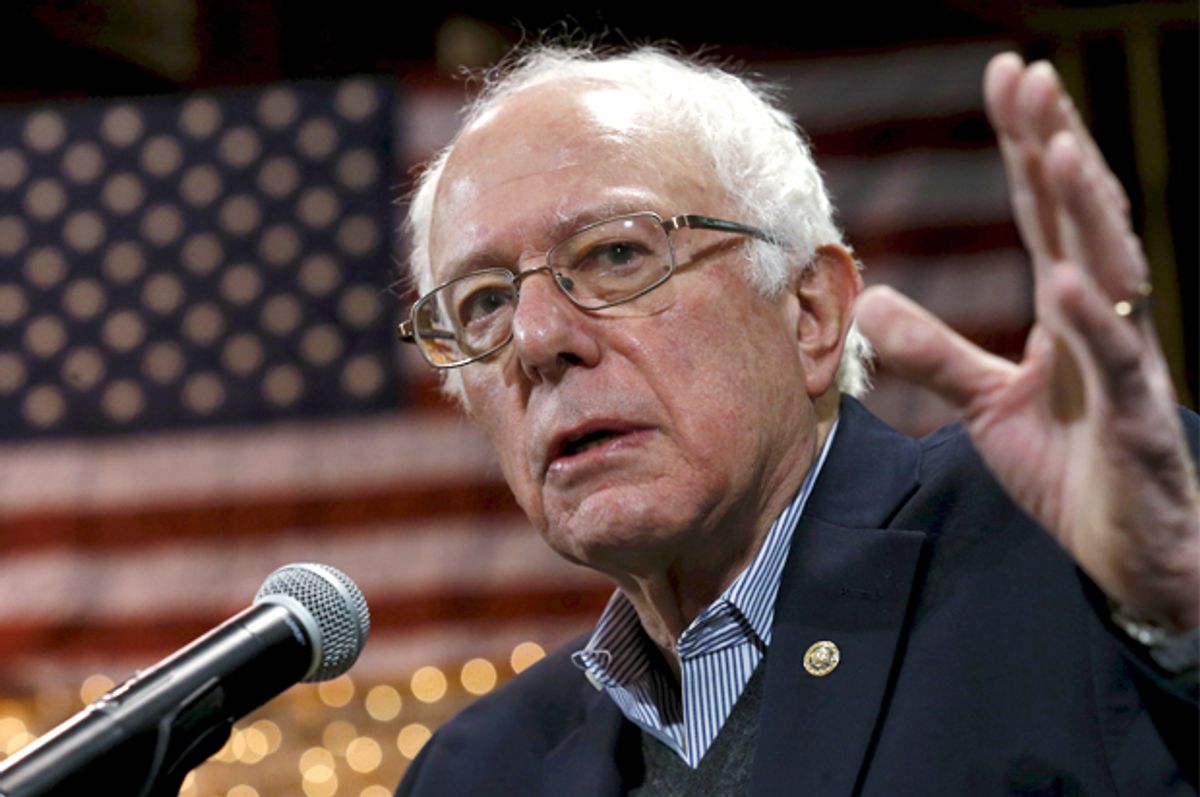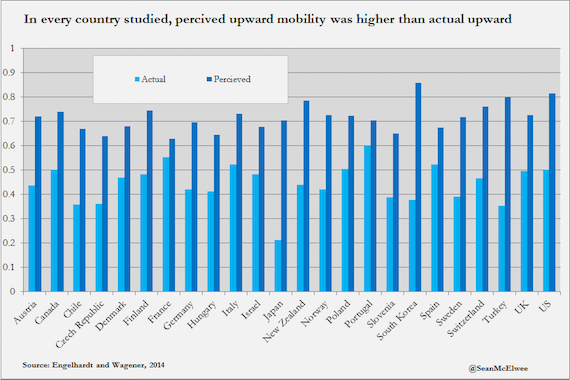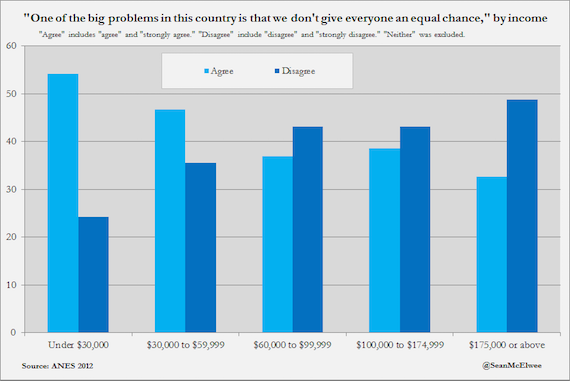This essay is modified from an essay published in "What Do We Do About Inequality?" by the Wicked Problems Collaborative. The book is available for pre-order here.
Inequality, President Obama has claimed, “is the defining challenge of our time.” And yet, though many of his reforms are positive, he has done far too little to actually alleviate inequality. But that’s not entirely his fault; presidents, like all other humans, are confined by their circumstances, both material and ideological. Although there are a number of factors that prevent action on inequality (including racial resentment and political information), one is ideological: our society’s commitment to the mythology of upward mobility. To see how ideology functions to halt legislative action on inequality, we should examine how a bipartisan commitment to upward mobility has obfuscated the true debate.
Is There Mobility?
A 2007 Treasury Department study of inequality allows us to examine mobility at the most elite level. On the horizontal axis is an individual’s position on the income spectrum in 1996. On the vertical level is where they were in 2005. To examine the myth of mobility, I focused on the chances of making it into the top 10, 5 or 1 percent. We see that these chances are abysmal. Only 0.2% of those who began in the bottom quintile made it into the top 1%. In contrast, 82.7% of those who began in the top 1% remained in the top 10% a decade later. Drake may have started from the bottom, but his experience is not representative of the American experience.
Studies show that this is true of capitalist systems broadly. In a recent study, Carina Engelhardt and Andreas Wagener find that in every country studied, perceptions of mobility were higher than actual mobility.
Why Does Everyone Believe in Mobility?
If upward mobility is illusory, why do politicians on both the left and right accept this fantasy? The main problem was recognized by Antonio Gramsci, who writes, “All men are intellectuals, but not all men have in society the function of intellectuals.” The people who benefit from inequality tend to attribute their success to themselves, rather than to luck or factors outside their control. These people then look upon the world and seek to justify it. Their justifications, because of elite power, are amplified, while the insights of the poor are ignored. The chart below, created using data from ANES, suggests that the wealthy are far more likely to believe that America is basically meritocratic. Only 33% of the richest in the survey (over $175,000 a year in family income) agree or strongly agree that “One of the big problems in this country is that we don't give everyone an equal chance,” compared with 54% of those earning less than $30,000.
Economist Branko Milanovic finds that 60% of an individual's income is determined before they are born (and tells me in an interview it’s likely higher). Economists Larry Mishel and Josh Bivens find “the increase in the incomes and wages of the top 1 percent over the last three decades should largely be interpreted as driven by the creation and/or redistribution of economic rents, and not simply as the outcome of well-functioning competitive markets rewarding skills or productivity based on marginal differences.” Higher-paid CEOs underperform lower-paid CEOs. Hedge fund managers are vastly overpaid. In 2013, the 25 highest-paid hedge fund managers made 2.5 times more than every kindergarten teacher in the U.S. combined. Yet every study finds that they can’t beat the market.
Instead of acknowledging that their wealth is largely due to circumstances they control, the rich moralize (and their fans encourage them to). As with a recent Business Insider piece, in which Steve Siebold writes, "Few people in the middle class really understand the mindset of the richest people. After all, if they did, they would be among the top earners as well. We’ve all heard the remarks: Rich people are lucky, rich people had an unfair advantage, rich people are crooks, rich people are selfish, etc. These are mostly empty statements with little proof to back them up."
This is, of course, risibly false. The wealthy have entrenched their advantages by investing more in their children while also supporting austerity measures that -- by leaving children undernourished and undereducated -- ensure the poor can rarely rise above their rank. But it’s unlikely the rich are even aware that they are justifying themselves. Psychologists have found numerous biases -- the self-serving bias, optimism bias and illusions of control -- that afflict us all. It is only the rich who are successful enough to become entirely delusional.
What Is the Consequence of Our Commitment to the Mythology of Mobility?
Our commitment to mobility prevents us from alleviating inequality. Writers, thinkers and politicians from nearly every political persuasion accept the mobility ideology in their speeches. Mike Lee warned last year of an “opportunity crisis.” Cathy McMorris Rodgers’s response to the State of the Union, which will likely define the Republican line on inequality, included the line, “The president talks a lot about income inequality. But the real gap we face today is one of opportunity inequality…” At the centrist Brookings Institution, opportunity is the watchword, with Richard Reeves’s recent essay, “Saving Horatio Algers,” which concludes, “On that spring evening in the nation’s capital, the crowd had gathered not to bury Alger, but to praise him. It is now time to pay him more than lip service. Equal opportunity must and will remain the quintessential American ideal. The challenge is to live up to it.” Kirsten Gillibrand, a liberal senator from New York, has pushed for an “American Opportunity Agenda.” Redistribution is out; mobility is in.
Yet the limits of mobility as a palliative to inequality should be obvious to anyone. Even in a society with perfect mobility, someone must be at the bottom. When inequality is high, the wealthy have more of an incentive to use whatever means possible to maintain their privilege. They use their economic and political power to solidify these positions, creating a glass floor from which they can look down upon the poor, whilst exhorting them to try harder. As inequality rises, the rich are more separated from the poor, and more likely to accept their ruling ideology (the “empathy gap”). Bo Rothstein and Eric Uslaner argue that, “the best policy response to growing inequality is to enact universalistic social welfare programs. However, the social strains stemming from increased inequality make it almost impossible to enact such policies.” As inequality increases, the winner-take-all economy leads voters try to look out for their own children. The period during which overall inequality has risen has seen a massive increase in more affluent families’ spending on enrichment for their own children.
Engelhardt and Wagener find that redistribution is lower when actual social mobility is but also lower where perceived mobility is higher. Even if voters perceive the level of inequality correctly, their tendency to overstate the level of mobility can undermine support for redistribution. In another study, Alberto Alesina and Eliana La Ferrara find that Americans who believe that American society offers equal opportunity (a mythology) are more likely to oppose redistribution. In another paper, Alesina, along with Edward Glaeser and Bruce Sacerdote, shows that the share of respondents in the country who think success is due to luck correlates strongly with social spending. This relationship makes sense: the safety net should be understood as social insurance, and understanding that an individual has little control over their circumstances increases support for universalistic programs. As the chart shows, the view that luck determines income is weak in the United States.
The authors also show that while 60% of respondents in the European Union believe the poor are trapped in poverty, only 29% of those in the United States do. Similarly, while only 26% of respondents in the European union say the poor are lazy, 60% of American respondents do (see table). Within the U.S., 88% who say that the U.S. spends too much on welfare believe the poor are lazy, compared with 35% of those who say the U.S. spends too little on welfare. These views are obviously mediated by race, as most of those who say the poor are lazy have a certain race of poor in mind. Using data from 33 democracies, Elvire Guillaud finds that those who believe they have experienced downward mobility in the past decade are 32% more likely to support redistribution.
Conclusion
Earlier this year, Martin Gilens and Benjamin Page rocketed to popular fame with a paper finding “average citizens’ preferences have little or no independent impact on policy.” Yet less reported was the finding that “the preferences of average citizens are positively and fairly highly correlated, across issues, with the preferences of economic elite.” This is not to say that economic elites and the general populace agree on everything -- as I’ve frequently argued, they do not. But it is where they agree, on issues like social mobility, that there are dangers. Certainly no one would reject the premise “we should increase social mobility,” but the ideological baggage upon which that statement rests is an important impediment to true progress on inequality.
As long as income is “earned,” and position is “merited,” those who support equality are fighting on enemy turf. A recent Pew Survey finds, “Nearly nine-in-ten (87%) agree that: ‘Our society should do what is necessary to make sure that everyone has an equal opportunity to succeed.’ The share agreeing with this statement has varied little over the past 22 years.” It’s certainly true that people on the lowest rungs of the economic ladder are more skeptical of markets and the story of upward mobility. But their voices rarely reach politicians. A recent study by David Broockman and Christopher Skovron finds that “conservative politicians systematically believe their constituents are more conservative than they actually are by more than 20 percentage points on average, and liberal politicians also typically overestimate their constituents’ conservatism by several percentage points.”
Elite control of the political system is certainly terrifying. Money flows through the veins of the political system like never before. But the control elites exercise over opinions and perceptions is certainly the more important factor -- and one even they are blithely unaware of.









Shares